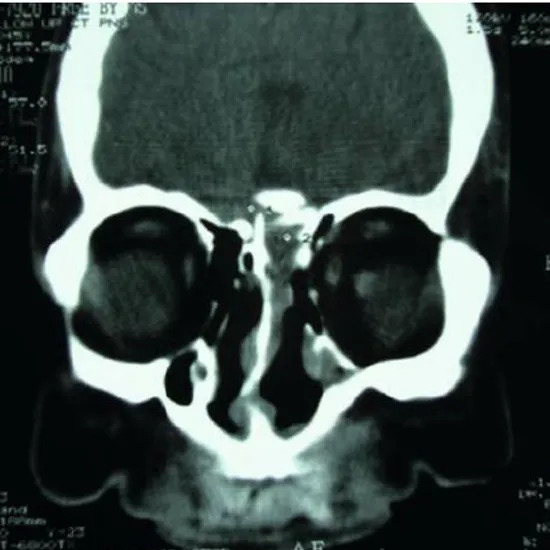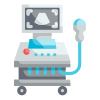Fill out form to enquire now
CECT PNS Sagittal
Medintu offers CECT PNS Sagittal-Contrast Enhancement Computed Tomography of the Paranasal Sinuses in the sagittal view is an advanced imaging modality to effect the correct diagnosis of sinus and nasal disorders provided by Medintu that presents minute details concerning sinus anatomy. The procedure relies on the administration of a contrast agent that makes structural visibility clear with which abnormalities like sinusitis, tumors, or nasal polyps can be precisely identified. The sagittal view has helped, particularly in the assessment of the complicated anatomy of the paranasal sinuses and the structures surrounding them with a view for accurate diagnosis and treatment. Medintu ensures an end-to-end experience from state-of-the-art technology to expert interpretation by a radiologist to provide minute details in the report for the health professional to help give the best patient care. Book an appointment today for your CECT PNS Sagittal scan and get diagnosed right on time.
What is CECT PNS Sagittal?
A CECT PNAS Sagittal scan is a higher-order imaging test intended to utilize the contrast effect in enhancing details of sinuses and associated structures. This will provide cross-sectional images, especially in the sagittal plane, with deep details that can enable health professionals to study conditions like sinusitis, tumors, and anatomical abnormalities accurately. Better clarity allows for effective diagnosis and treatment planning; hence, it constitutes a very useful tool in otolaryngology and related fields.
Conditions that can be diagnosed
CECT PNS Sagittal scans provide a wide range of information useful in the diagnosis of pathological conditions of the paranasal sinuses and surrounding structures. Some common pathologies identifiable with the help of this modality include but are not limited to the following:
Sinusitis-infection or inflammation of the sinus cavities, generally causing pain, swelling, and congestion.
Nasal Polyps: non-malignant growths within the nasal passages which may cause impairment in airflow and further lead to sinus problems.
Tumors: benign and malignant tumors are diagnosable in the sinuses or nasal cavity.
Chronic Rhinosinusitis: Long-term inflammation of the sinuses may necessitate surgical intervention to open the sinuses themselves.
Fungal Infections: Diagnosis of invasive fungal infections, especially among immunocompromised patients.
Cysts: Mucoceles, diagnosis, and any cystic lesions of the sinuses.
Deviated Septum: The examination of structural abnormalities that may influence the draining of the sinus and airflow.
Trauma: To rule out sinus injury or fracture after trauma to the face.
Risks and safety considerations
Overall, CECT PNS Sagittal scans have few risks. These studies do expose the patient to ionizing radiation, which is generally low but should be kept as low as possible, particularly in children. Allergic reactions to the contrast agent, including mild itching to severe anaphylaxis, can occur hence the patient should communicate to the health provider regarding any known allergies. Also, the contrast may act on renal function, especially in predisposed states, hence the renal function tests before the procedure. Needless exposure should be avoided in pregnant women; anxiety or discomfort might occur during the scanning. This will allow for open communication with the healthcare team for a safer experience.
Why is a CECT PNS Sagittal Scan Recommended?
A sagittal scan of CECT PNS will be advised because it shows more detailed pictures of the paranasal sinuses and their surrounding structures, thus making it invaluable in many clinical situations. This is very useful in the assessment of diseases like chronic sinusitis, where inflammation and obstruction of the sinus pathways give rise to persistent symptoms. The scan outlines the nasal polyps, which obstruct airflow and may be responsible for sinus problems. It allows the identification of tumors-benign or malignant-for intervention. Such a sagittal view further allows the delineation of complex anatomy in great detail, which will be quite useful in the proper diagnosis and planning of treatment in patients with symptoms or abnormalities of the sinus.
Advantages of CECT PNS Sagittal Over Other Imaging Techniques
Sagittal scans of CECT PNS, therefore, have advantages over others: Contrast media enhances visualization gives better differentiation of soft tissue structures, and outlines pathological conditions like tumors and inflammation. Comparatively, CECT provides more detailed and comprehensive images than conventional X-rays for the evaluation of the complex anatomy of the sinus. Subtle lesions are much better detected with CECT, with improved diagnostic accuracy compared to a non-contrast-enhanced CT. Considering that MRI is good for soft tissue assessment, often CECT goes faster and is more available, thus suitable for patients who might have problems keeping still for a long time. Besides, CECT is less sensitive to motion artifacts-meaning sharper images. Listed above, these advantages make CECT PNS Sagittal scans the favorite modality for doing accurate diagnosis and effective treatment planning in conditions related to the sinus.
- Test Type: CECT PNS Sagittal
- Preparation:
- Wear a loose-fitting cloth
- Fasting required
- Carry Your ID Proof
- Prescription is mandatory for patients with a doctor’s sign, stamp, with DMC/HMC number; as per PC-PNDT Act
- Reports Time: With in 3-4 hours
- Test Price: Rs.2500
What is a CECT PNS Sagittal scan?
A CECT PNAS Sagittal scan is a particular type of imaging that involves the use of contrast-enhanced computed tomography in the production of highly detailed images of the paranasal sinuses and their surrounding structures in the sagittal view.
How do I prepare for the scan?
Patients are often required to stop eating and drinking a few hours before the test. Inform your doctor about the allergies you have and medications that you are on, particularly if you have had a severe reaction to the contrast agent in the past.
Are there any risks or complications of the scan?
The risks include ionizing radiation exposure, allergic reaction to the contrast medium, and implications for renal function. This is also important to discuss with your doctor.
Does the CECT PNS Sagittal scan hurt?
The scan itself doesn’t hurt. However, some people might feel discomfort related to staying still in the scanner or from mild pressure during the injection of the contrast agent.
How to book a CECT PNS Sagittal scan with Medintu?
You can easily book a slot for a CECT PNS Sagittal scan by visiting Medintu’s official site or by contacting us at +919100907036/+919100907622.
Why Choose Medintu for CECT PNS Sagittal?
If you choose Medintu for your CECT PNS Sagittal scan, the whole process shall be hassle-free and patient-friendly. State-of-the-art imaging ensures correct and timely diagnosis with sub-specialized radiologists. In every respect, quality is ensured by us right from personalized care and explanation to the follow-up after the procedure. Medintu has joined hands with premier diagnostic centers to assure the service of the highest grade quality at competitive prices. Furthermore, the path of queries is open 24*7 through our dedicated customer care which shall be very convenient and time-effective for your health journey. Count on Medintu for safe, available, and complete diagnostic solutions.





